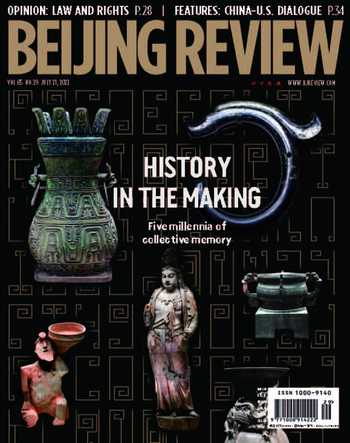CRYSTALLOGRAPHER DIES AT 88
2022-07-22
Fan Haifu, physicist and academician of the Chinese Academy of Sciences (CAS) and the World Academy of Sciences (TWAS), passed away from illness on July 8 in Beijing at the age of 88.
Fan was born in Guangzhou, Guangdong Province. He graduated from Peking University in 1956, where he majored in chemistry. He started his career at the Institute of Physics under CAS in Beijing and became a researcher in 1986.
His professional achievements contributed to global X-ray crystallography, the experimental science determining the atomic and molecular structure of a crystal, and electron microscopy. Throughout his lifetime, he received multiple national and global honors, including the TWAS award in physics in 1996. Together with British physicist Michael Woolfson, he published a book titled Physical and Nonphysical Methods of Solving Crystal Structures.
Guangming Daily July 14
The phrase “China’s flexibly employed reaches 200 million” became one of the top searches on Weibo, China’s Twitter, in February. Recent analysis by AliResearch, a think tank of Alibaba Group, indicated that the number of China’s gig workers will hit 400 million by 2036.
It’s therefore safe to say the gig economy has a big stake in the overall Chinese economy.
Beyond ride-hailing and express delivery services, which are at the core of China’s gig economy, a growing number of young people armed with hi-tech knowledge, too, are becoming part of this rising economic force. The gig economy not only helps ease employment pressures, but also plays a big role in promoting high-quality economic growth and improving the public’s livelihoods.
Nevertheless, there’s still much work to be done to help those involved in the gig economy, such as the creation of a stronger social safety net. The Central Government is seeking better regulations to serve the rights of workers, foster new skills and startups and ensure healthy and balanced development in the job market.
Oriental Outlook July 7
This year’s JD.com 618 Shopping Festival, the second largest online sale in China that takes place every year on June 18, stood out for its whopping trade volume of domestic goods. Recent years have seen demand for domestic brands soar on ecommerce platforms, while nationallevel exhibitions continue to build the reputation of domestic goods.

Chinese brands seek to lift the manufacturing industry to a higher level of quality and services.
To satisfy consumers’ appetite for domestic goods, new local brands are sprouting ubiquitously. Chinadesigned goods empowered by the latest developments in science and technology and boasting advanced craftsmanship are particularly popular with younger consumers.
For domestic goods to keep riding the current wave of popularity, China’s manufacturing sector needs to create more world-famous, premium-quality brands, not only to sustain the local love for domestic brands, but also to secure a bigger share in the global market.
Yangcheng Evening News July 14
In order to attract applicants, Yunnan Agricultural University recently released a short video, which has so far received 1.39 million likes. But despite the attractive picture of agricultural studies this video paints, young people still seem to be lacking enthusiasm to actually enroll.
In China, rarely do students apply to agricultural schools or take agriculture as a major in college. Chinese students have long been instilled with values that downplay agriculture and the countryside on the whole. Rural students are told their best choice is to leave their underdeveloped rural hometowns and attend university in China’s urbanized regions.
But if all students, particularly those from the countryside, shun majors related to agriculture and seek to leave their villages, who will vitalize China’s rural economy?
Nowadays, students in agricultural schools learn how to develop modern ecological and digital agriculture based on the latest developments in science and technology. They won’t be toiling away in the fields. Agricultural studies also delve into the relationships between the social, economic, political and environmental factors that affect the agricultural sector—from farm level production to international policy. An updated attitude toward agriculture is the key to fueling the young enthusiasm for agricultural studies.
A public prosecution has been initiated against former Minister of Justice Fu Zhenghua as he “traded power for personal gain and accepted huge amounts of bribes,” China’s top prosecuting authority said on July 11.
Fu allegedly abused his various positions as head of the Beijing Public Security Bureau, deputy head of the Ministry of Public Security and head of the Ministry of Justice to benefit others. In return, he accepted extremely large bribes. He further stands accused of sheltering criminals.
Fu rose through the ranks of China’s public security and judicial systems, eventually becoming Beijing’s police chief and then minister of justice.
He was placed under investigation for suspected severe violations of discipline and law in October 2021. China’s anticorruption body said Fu had lost his “Party spirit and principles.”
“We need more than ever multilateralism. But not any kind of multilateralism… a networked multilateralism.”
António Guterres, UN Secretary General, ahead of the EU-UN High-Level Dialogue, on July 7
“The choice we make today determines where the path will take us from now on—openness or isolation, cooperation or confrontation, solidarity or division, progress or regression.”
Wang Yi, Chinese State Councilor and Foreign Minister, in a speech at the ASEAN Secretariat on July 11
“RCEP is the most ambitious regional free trade agreement in Asia in which China has played a vital role in converting Asian economy into a core economic polar...”
Kin Phea, Director General of the International Relations Institute at the Royal Academy of Cambodia, in a recent interview with Xinhua News Agency
“New waves of the virus demonstrate once again that COVID-19 is nowhere near over.”
Tedros Adhanom Ghebreyesus, Director General of the World Health Organization, at a news conference on July 13
